Culture's Significance: A Comparative Analysis of Business
VerifiedAdded on 2023/06/09
|8
|2128
|487
Essay
AI Summary
This essay delves into the critical role of culture in shaping business practices, using the United Kingdom and Spain as case studies. It begins by defining culture and its impact on individual and group behavior, emphasizing its influence on business styles. The paper then analyzes the national cultures of the UK and Spain through the lens of Hofstede's cultural dimensions, highlighting how individualism, masculinity, power distance, uncertainty avoidance, long-term orientation, and indulgence affect their respective business environments. The UK, characterized by individualism and a focus on achievement, contrasts with Spain, which exhibits a more collective approach and a higher degree of uncertainty avoidance. The essay concludes by underscoring the direct relationship between national culture and business practices, demonstrating how cultural differences lead to distinct business approaches in these two nations.
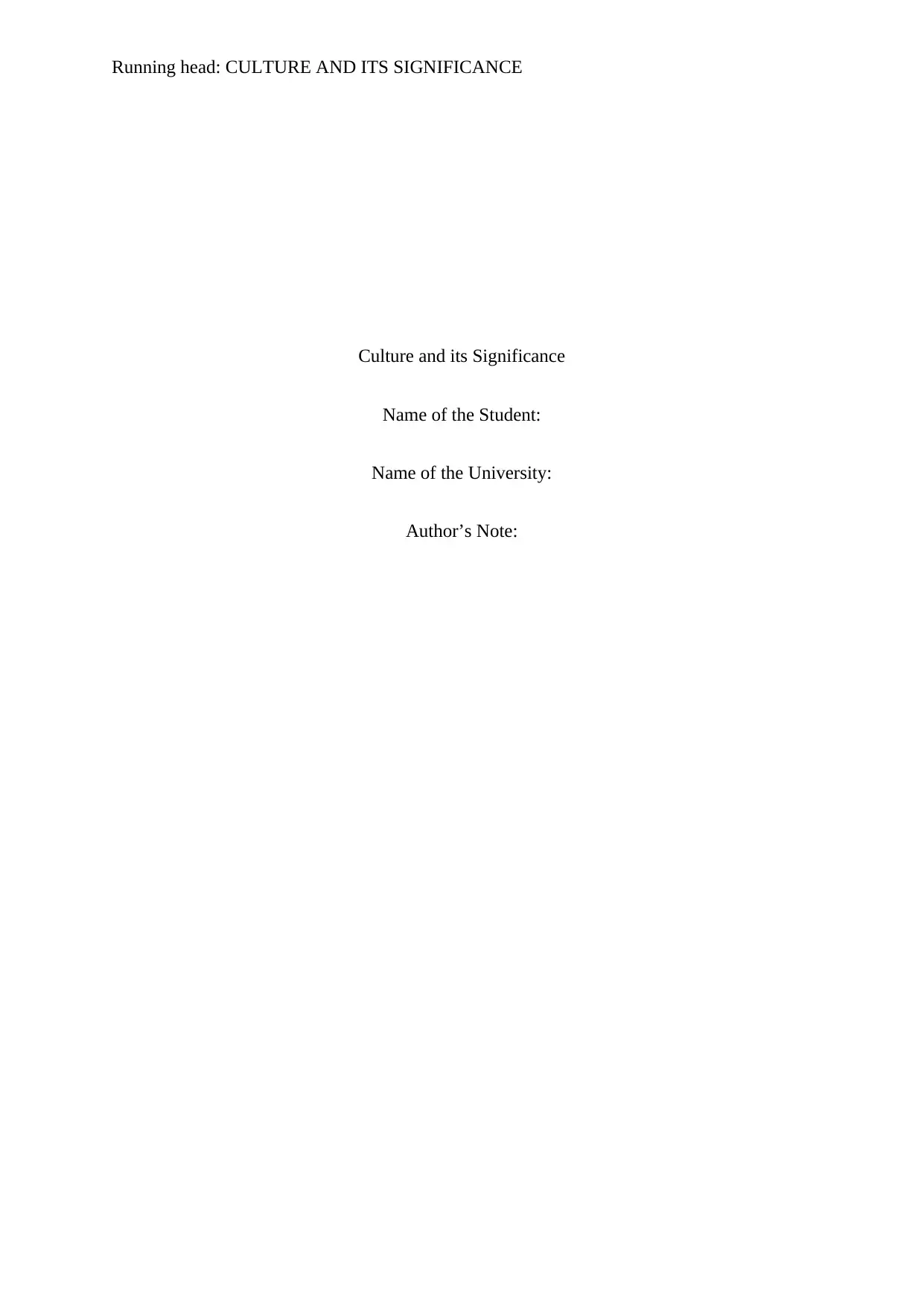
Running head: CULTURE AND ITS SIGNIFICANCE
Culture and its Significance
Name of the Student:
Name of the University:
Author’s Note:
Culture and its Significance
Name of the Student:
Name of the University:
Author’s Note:
Paraphrase This Document
Need a fresh take? Get an instant paraphrase of this document with our AI Paraphraser
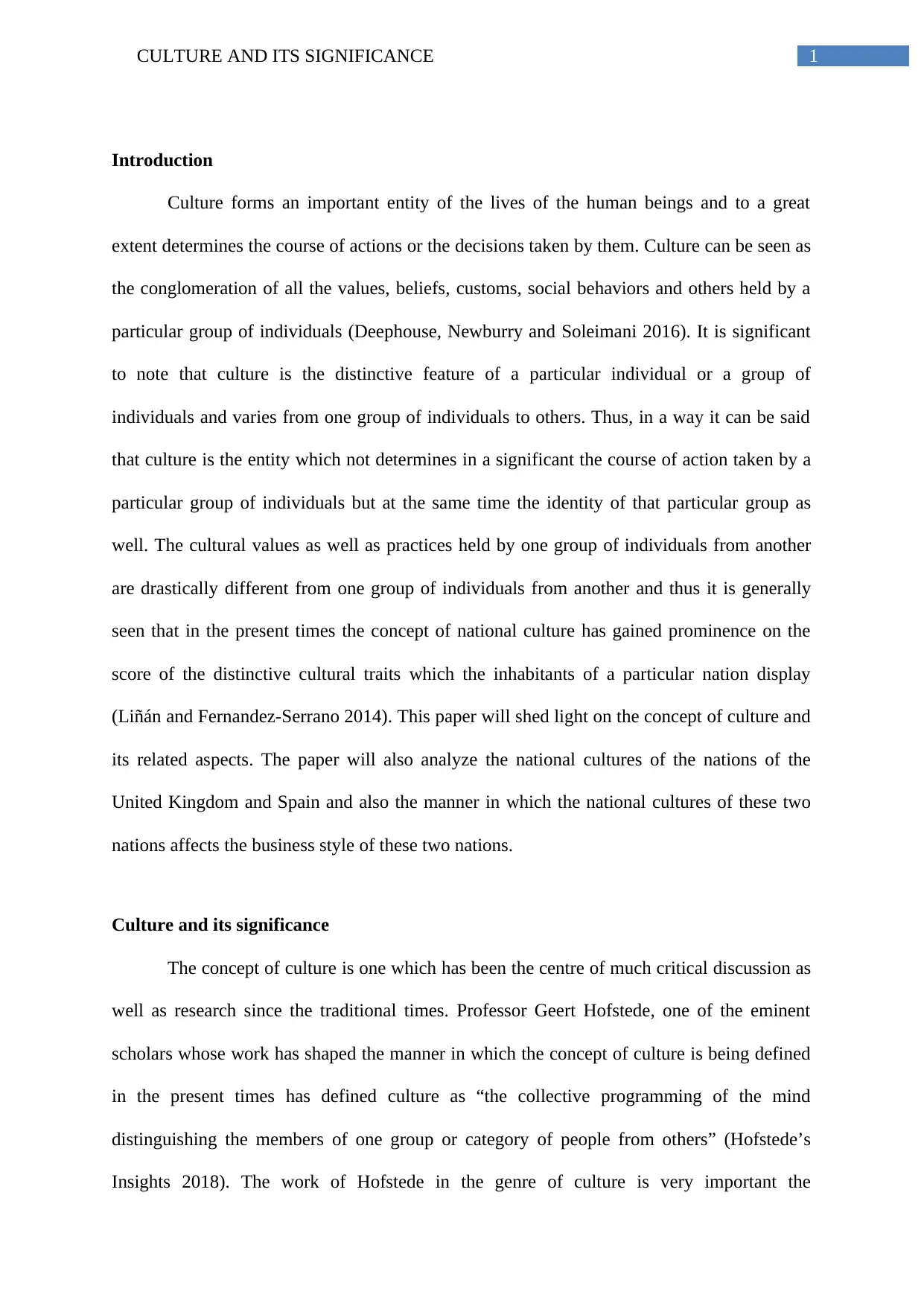
1CULTURE AND ITS SIGNIFICANCE
Introduction
Culture forms an important entity of the lives of the human beings and to a great
extent determines the course of actions or the decisions taken by them. Culture can be seen as
the conglomeration of all the values, beliefs, customs, social behaviors and others held by a
particular group of individuals (Deephouse, Newburry and Soleimani 2016). It is significant
to note that culture is the distinctive feature of a particular individual or a group of
individuals and varies from one group of individuals to others. Thus, in a way it can be said
that culture is the entity which not determines in a significant the course of action taken by a
particular group of individuals but at the same time the identity of that particular group as
well. The cultural values as well as practices held by one group of individuals from another
are drastically different from one group of individuals from another and thus it is generally
seen that in the present times the concept of national culture has gained prominence on the
score of the distinctive cultural traits which the inhabitants of a particular nation display
(Liñán and Fernandez-Serrano 2014). This paper will shed light on the concept of culture and
its related aspects. The paper will also analyze the national cultures of the nations of the
United Kingdom and Spain and also the manner in which the national cultures of these two
nations affects the business style of these two nations.
Culture and its significance
The concept of culture is one which has been the centre of much critical discussion as
well as research since the traditional times. Professor Geert Hofstede, one of the eminent
scholars whose work has shaped the manner in which the concept of culture is being defined
in the present times has defined culture as “the collective programming of the mind
distinguishing the members of one group or category of people from others” (Hofstede’s
Insights 2018). The work of Hofstede in the genre of culture is very important the
Introduction
Culture forms an important entity of the lives of the human beings and to a great
extent determines the course of actions or the decisions taken by them. Culture can be seen as
the conglomeration of all the values, beliefs, customs, social behaviors and others held by a
particular group of individuals (Deephouse, Newburry and Soleimani 2016). It is significant
to note that culture is the distinctive feature of a particular individual or a group of
individuals and varies from one group of individuals to others. Thus, in a way it can be said
that culture is the entity which not determines in a significant the course of action taken by a
particular group of individuals but at the same time the identity of that particular group as
well. The cultural values as well as practices held by one group of individuals from another
are drastically different from one group of individuals from another and thus it is generally
seen that in the present times the concept of national culture has gained prominence on the
score of the distinctive cultural traits which the inhabitants of a particular nation display
(Liñán and Fernandez-Serrano 2014). This paper will shed light on the concept of culture and
its related aspects. The paper will also analyze the national cultures of the nations of the
United Kingdom and Spain and also the manner in which the national cultures of these two
nations affects the business style of these two nations.
Culture and its significance
The concept of culture is one which has been the centre of much critical discussion as
well as research since the traditional times. Professor Geert Hofstede, one of the eminent
scholars whose work has shaped the manner in which the concept of culture is being defined
in the present times has defined culture as “the collective programming of the mind
distinguishing the members of one group or category of people from others” (Hofstede’s
Insights 2018). The work of Hofstede in the genre of culture is very important the
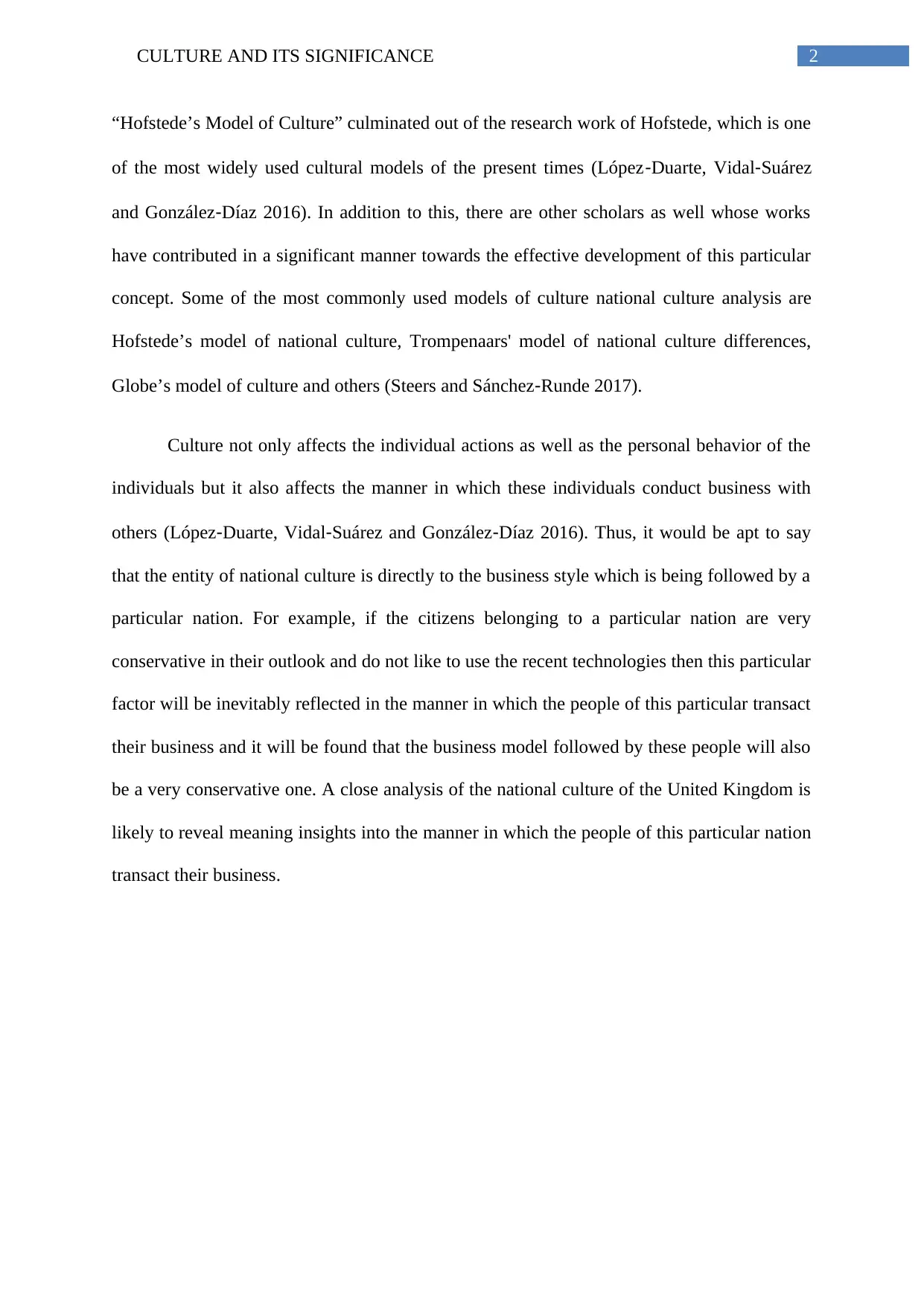
2CULTURE AND ITS SIGNIFICANCE
“Hofstede’s Model of Culture” culminated out of the research work of Hofstede, which is one
of the most widely used cultural models of the present times (López‐Duarte, Vidal‐Suárez
and González‐Díaz 2016). In addition to this, there are other scholars as well whose works
have contributed in a significant manner towards the effective development of this particular
concept. Some of the most commonly used models of culture national culture analysis are
Hofstede’s model of national culture, Trompenaars' model of national culture differences,
Globe’s model of culture and others (Steers and Sánchez‐Runde 2017).
Culture not only affects the individual actions as well as the personal behavior of the
individuals but it also affects the manner in which these individuals conduct business with
others (López‐Duarte, Vidal‐Suárez and González‐Díaz 2016). Thus, it would be apt to say
that the entity of national culture is directly to the business style which is being followed by a
particular nation. For example, if the citizens belonging to a particular nation are very
conservative in their outlook and do not like to use the recent technologies then this particular
factor will be inevitably reflected in the manner in which the people of this particular transact
their business and it will be found that the business model followed by these people will also
be a very conservative one. A close analysis of the national culture of the United Kingdom is
likely to reveal meaning insights into the manner in which the people of this particular nation
transact their business.
“Hofstede’s Model of Culture” culminated out of the research work of Hofstede, which is one
of the most widely used cultural models of the present times (López‐Duarte, Vidal‐Suárez
and González‐Díaz 2016). In addition to this, there are other scholars as well whose works
have contributed in a significant manner towards the effective development of this particular
concept. Some of the most commonly used models of culture national culture analysis are
Hofstede’s model of national culture, Trompenaars' model of national culture differences,
Globe’s model of culture and others (Steers and Sánchez‐Runde 2017).
Culture not only affects the individual actions as well as the personal behavior of the
individuals but it also affects the manner in which these individuals conduct business with
others (López‐Duarte, Vidal‐Suárez and González‐Díaz 2016). Thus, it would be apt to say
that the entity of national culture is directly to the business style which is being followed by a
particular nation. For example, if the citizens belonging to a particular nation are very
conservative in their outlook and do not like to use the recent technologies then this particular
factor will be inevitably reflected in the manner in which the people of this particular transact
their business and it will be found that the business model followed by these people will also
be a very conservative one. A close analysis of the national culture of the United Kingdom is
likely to reveal meaning insights into the manner in which the people of this particular nation
transact their business.
⊘ This is a preview!⊘
Do you want full access?
Subscribe today to unlock all pages.

Trusted by 1+ million students worldwide
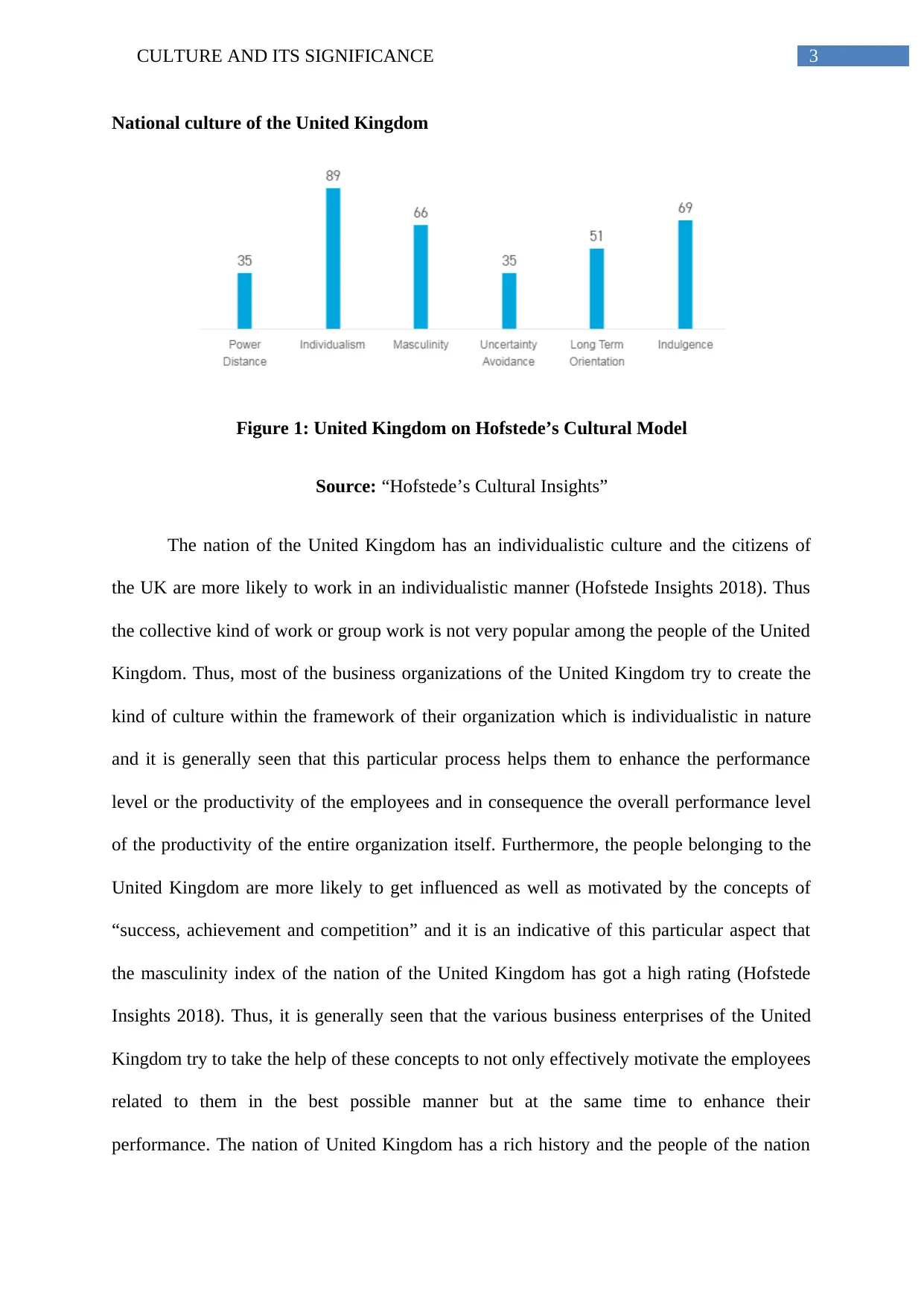
3CULTURE AND ITS SIGNIFICANCE
National culture of the United Kingdom
Figure 1: United Kingdom on Hofstede’s Cultural Model
Source: “Hofstede’s Cultural Insights”
The nation of the United Kingdom has an individualistic culture and the citizens of
the UK are more likely to work in an individualistic manner (Hofstede Insights 2018). Thus
the collective kind of work or group work is not very popular among the people of the United
Kingdom. Thus, most of the business organizations of the United Kingdom try to create the
kind of culture within the framework of their organization which is individualistic in nature
and it is generally seen that this particular process helps them to enhance the performance
level or the productivity of the employees and in consequence the overall performance level
of the productivity of the entire organization itself. Furthermore, the people belonging to the
United Kingdom are more likely to get influenced as well as motivated by the concepts of
“success, achievement and competition” and it is an indicative of this particular aspect that
the masculinity index of the nation of the United Kingdom has got a high rating (Hofstede
Insights 2018). Thus, it is generally seen that the various business enterprises of the United
Kingdom try to take the help of these concepts to not only effectively motivate the employees
related to them in the best possible manner but at the same time to enhance their
performance. The nation of United Kingdom has a rich history and the people of the nation
National culture of the United Kingdom
Figure 1: United Kingdom on Hofstede’s Cultural Model
Source: “Hofstede’s Cultural Insights”
The nation of the United Kingdom has an individualistic culture and the citizens of
the UK are more likely to work in an individualistic manner (Hofstede Insights 2018). Thus
the collective kind of work or group work is not very popular among the people of the United
Kingdom. Thus, most of the business organizations of the United Kingdom try to create the
kind of culture within the framework of their organization which is individualistic in nature
and it is generally seen that this particular process helps them to enhance the performance
level or the productivity of the employees and in consequence the overall performance level
of the productivity of the entire organization itself. Furthermore, the people belonging to the
United Kingdom are more likely to get influenced as well as motivated by the concepts of
“success, achievement and competition” and it is an indicative of this particular aspect that
the masculinity index of the nation of the United Kingdom has got a high rating (Hofstede
Insights 2018). Thus, it is generally seen that the various business enterprises of the United
Kingdom try to take the help of these concepts to not only effectively motivate the employees
related to them in the best possible manner but at the same time to enhance their
performance. The nation of United Kingdom has a rich history and the people of the nation
Paraphrase This Document
Need a fresh take? Get an instant paraphrase of this document with our AI Paraphraser
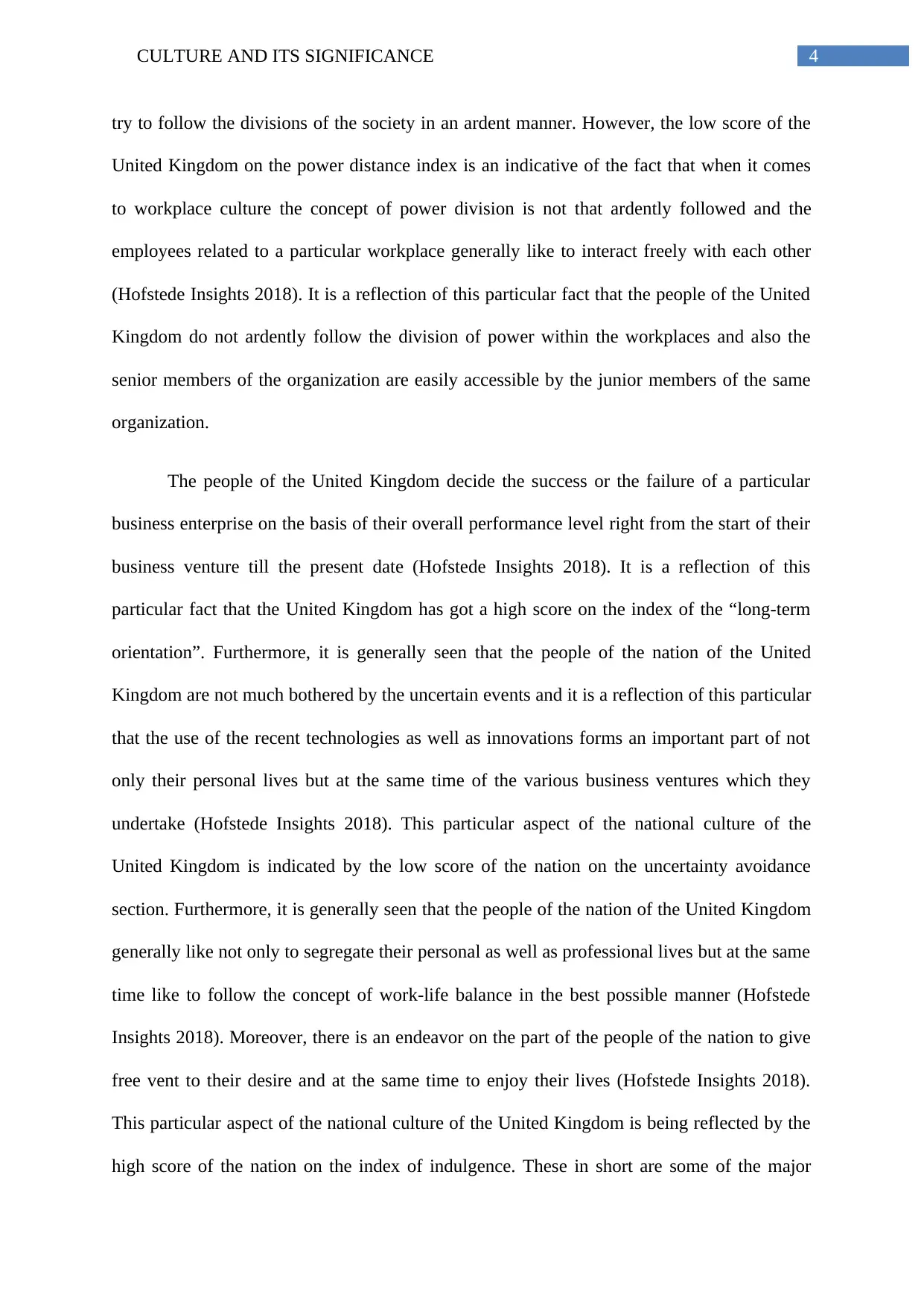
4CULTURE AND ITS SIGNIFICANCE
try to follow the divisions of the society in an ardent manner. However, the low score of the
United Kingdom on the power distance index is an indicative of the fact that when it comes
to workplace culture the concept of power division is not that ardently followed and the
employees related to a particular workplace generally like to interact freely with each other
(Hofstede Insights 2018). It is a reflection of this particular fact that the people of the United
Kingdom do not ardently follow the division of power within the workplaces and also the
senior members of the organization are easily accessible by the junior members of the same
organization.
The people of the United Kingdom decide the success or the failure of a particular
business enterprise on the basis of their overall performance level right from the start of their
business venture till the present date (Hofstede Insights 2018). It is a reflection of this
particular fact that the United Kingdom has got a high score on the index of the “long-term
orientation”. Furthermore, it is generally seen that the people of the nation of the United
Kingdom are not much bothered by the uncertain events and it is a reflection of this particular
that the use of the recent technologies as well as innovations forms an important part of not
only their personal lives but at the same time of the various business ventures which they
undertake (Hofstede Insights 2018). This particular aspect of the national culture of the
United Kingdom is indicated by the low score of the nation on the uncertainty avoidance
section. Furthermore, it is generally seen that the people of the nation of the United Kingdom
generally like not only to segregate their personal as well as professional lives but at the same
time like to follow the concept of work-life balance in the best possible manner (Hofstede
Insights 2018). Moreover, there is an endeavor on the part of the people of the nation to give
free vent to their desire and at the same time to enjoy their lives (Hofstede Insights 2018).
This particular aspect of the national culture of the United Kingdom is being reflected by the
high score of the nation on the index of indulgence. These in short are some of the major
try to follow the divisions of the society in an ardent manner. However, the low score of the
United Kingdom on the power distance index is an indicative of the fact that when it comes
to workplace culture the concept of power division is not that ardently followed and the
employees related to a particular workplace generally like to interact freely with each other
(Hofstede Insights 2018). It is a reflection of this particular fact that the people of the United
Kingdom do not ardently follow the division of power within the workplaces and also the
senior members of the organization are easily accessible by the junior members of the same
organization.
The people of the United Kingdom decide the success or the failure of a particular
business enterprise on the basis of their overall performance level right from the start of their
business venture till the present date (Hofstede Insights 2018). It is a reflection of this
particular fact that the United Kingdom has got a high score on the index of the “long-term
orientation”. Furthermore, it is generally seen that the people of the nation of the United
Kingdom are not much bothered by the uncertain events and it is a reflection of this particular
that the use of the recent technologies as well as innovations forms an important part of not
only their personal lives but at the same time of the various business ventures which they
undertake (Hofstede Insights 2018). This particular aspect of the national culture of the
United Kingdom is indicated by the low score of the nation on the uncertainty avoidance
section. Furthermore, it is generally seen that the people of the nation of the United Kingdom
generally like not only to segregate their personal as well as professional lives but at the same
time like to follow the concept of work-life balance in the best possible manner (Hofstede
Insights 2018). Moreover, there is an endeavor on the part of the people of the nation to give
free vent to their desire and at the same time to enjoy their lives (Hofstede Insights 2018).
This particular aspect of the national culture of the United Kingdom is being reflected by the
high score of the nation on the index of indulgence. These in short are some of the major
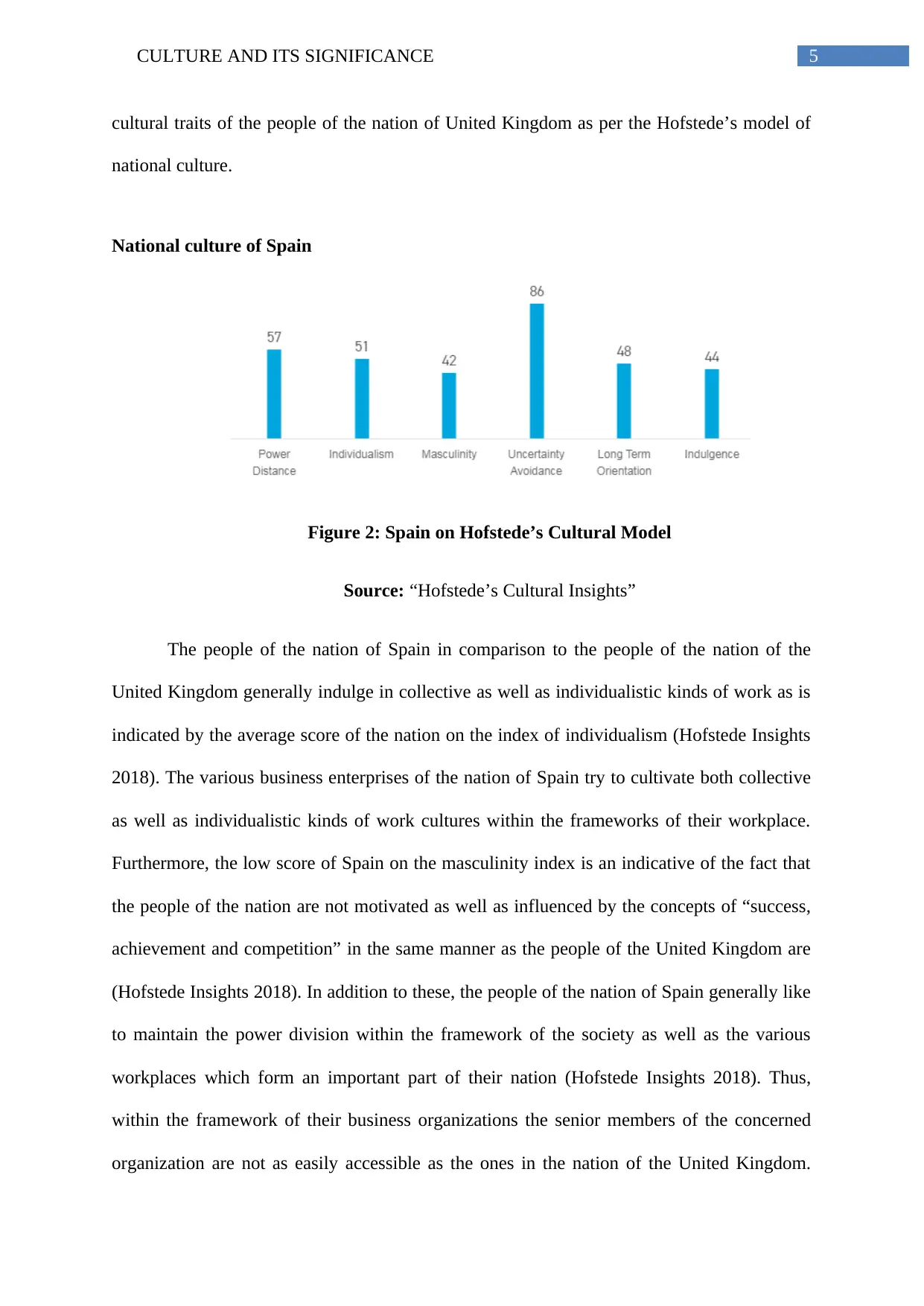
5CULTURE AND ITS SIGNIFICANCE
cultural traits of the people of the nation of United Kingdom as per the Hofstede’s model of
national culture.
National culture of Spain
Figure 2: Spain on Hofstede’s Cultural Model
Source: “Hofstede’s Cultural Insights”
The people of the nation of Spain in comparison to the people of the nation of the
United Kingdom generally indulge in collective as well as individualistic kinds of work as is
indicated by the average score of the nation on the index of individualism (Hofstede Insights
2018). The various business enterprises of the nation of Spain try to cultivate both collective
as well as individualistic kinds of work cultures within the frameworks of their workplace.
Furthermore, the low score of Spain on the masculinity index is an indicative of the fact that
the people of the nation are not motivated as well as influenced by the concepts of “success,
achievement and competition” in the same manner as the people of the United Kingdom are
(Hofstede Insights 2018). In addition to these, the people of the nation of Spain generally like
to maintain the power division within the framework of the society as well as the various
workplaces which form an important part of their nation (Hofstede Insights 2018). Thus,
within the framework of their business organizations the senior members of the concerned
organization are not as easily accessible as the ones in the nation of the United Kingdom.
cultural traits of the people of the nation of United Kingdom as per the Hofstede’s model of
national culture.
National culture of Spain
Figure 2: Spain on Hofstede’s Cultural Model
Source: “Hofstede’s Cultural Insights”
The people of the nation of Spain in comparison to the people of the nation of the
United Kingdom generally indulge in collective as well as individualistic kinds of work as is
indicated by the average score of the nation on the index of individualism (Hofstede Insights
2018). The various business enterprises of the nation of Spain try to cultivate both collective
as well as individualistic kinds of work cultures within the frameworks of their workplace.
Furthermore, the low score of Spain on the masculinity index is an indicative of the fact that
the people of the nation are not motivated as well as influenced by the concepts of “success,
achievement and competition” in the same manner as the people of the United Kingdom are
(Hofstede Insights 2018). In addition to these, the people of the nation of Spain generally like
to maintain the power division within the framework of the society as well as the various
workplaces which form an important part of their nation (Hofstede Insights 2018). Thus,
within the framework of their business organizations the senior members of the concerned
organization are not as easily accessible as the ones in the nation of the United Kingdom.
⊘ This is a preview!⊘
Do you want full access?
Subscribe today to unlock all pages.

Trusted by 1+ million students worldwide
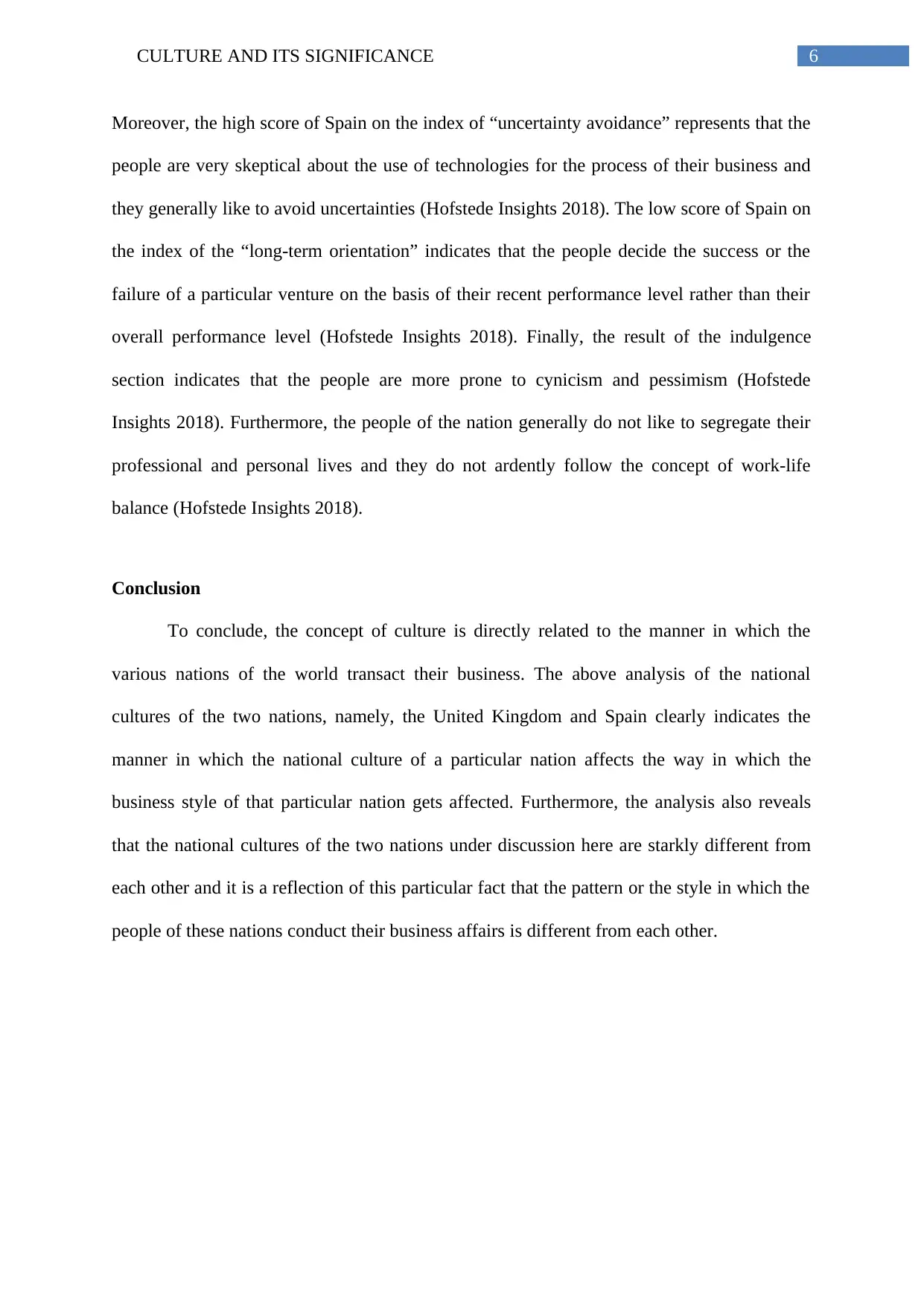
6CULTURE AND ITS SIGNIFICANCE
Moreover, the high score of Spain on the index of “uncertainty avoidance” represents that the
people are very skeptical about the use of technologies for the process of their business and
they generally like to avoid uncertainties (Hofstede Insights 2018). The low score of Spain on
the index of the “long-term orientation” indicates that the people decide the success or the
failure of a particular venture on the basis of their recent performance level rather than their
overall performance level (Hofstede Insights 2018). Finally, the result of the indulgence
section indicates that the people are more prone to cynicism and pessimism (Hofstede
Insights 2018). Furthermore, the people of the nation generally do not like to segregate their
professional and personal lives and they do not ardently follow the concept of work-life
balance (Hofstede Insights 2018).
Conclusion
To conclude, the concept of culture is directly related to the manner in which the
various nations of the world transact their business. The above analysis of the national
cultures of the two nations, namely, the United Kingdom and Spain clearly indicates the
manner in which the national culture of a particular nation affects the way in which the
business style of that particular nation gets affected. Furthermore, the analysis also reveals
that the national cultures of the two nations under discussion here are starkly different from
each other and it is a reflection of this particular fact that the pattern or the style in which the
people of these nations conduct their business affairs is different from each other.
Moreover, the high score of Spain on the index of “uncertainty avoidance” represents that the
people are very skeptical about the use of technologies for the process of their business and
they generally like to avoid uncertainties (Hofstede Insights 2018). The low score of Spain on
the index of the “long-term orientation” indicates that the people decide the success or the
failure of a particular venture on the basis of their recent performance level rather than their
overall performance level (Hofstede Insights 2018). Finally, the result of the indulgence
section indicates that the people are more prone to cynicism and pessimism (Hofstede
Insights 2018). Furthermore, the people of the nation generally do not like to segregate their
professional and personal lives and they do not ardently follow the concept of work-life
balance (Hofstede Insights 2018).
Conclusion
To conclude, the concept of culture is directly related to the manner in which the
various nations of the world transact their business. The above analysis of the national
cultures of the two nations, namely, the United Kingdom and Spain clearly indicates the
manner in which the national culture of a particular nation affects the way in which the
business style of that particular nation gets affected. Furthermore, the analysis also reveals
that the national cultures of the two nations under discussion here are starkly different from
each other and it is a reflection of this particular fact that the pattern or the style in which the
people of these nations conduct their business affairs is different from each other.
Paraphrase This Document
Need a fresh take? Get an instant paraphrase of this document with our AI Paraphraser
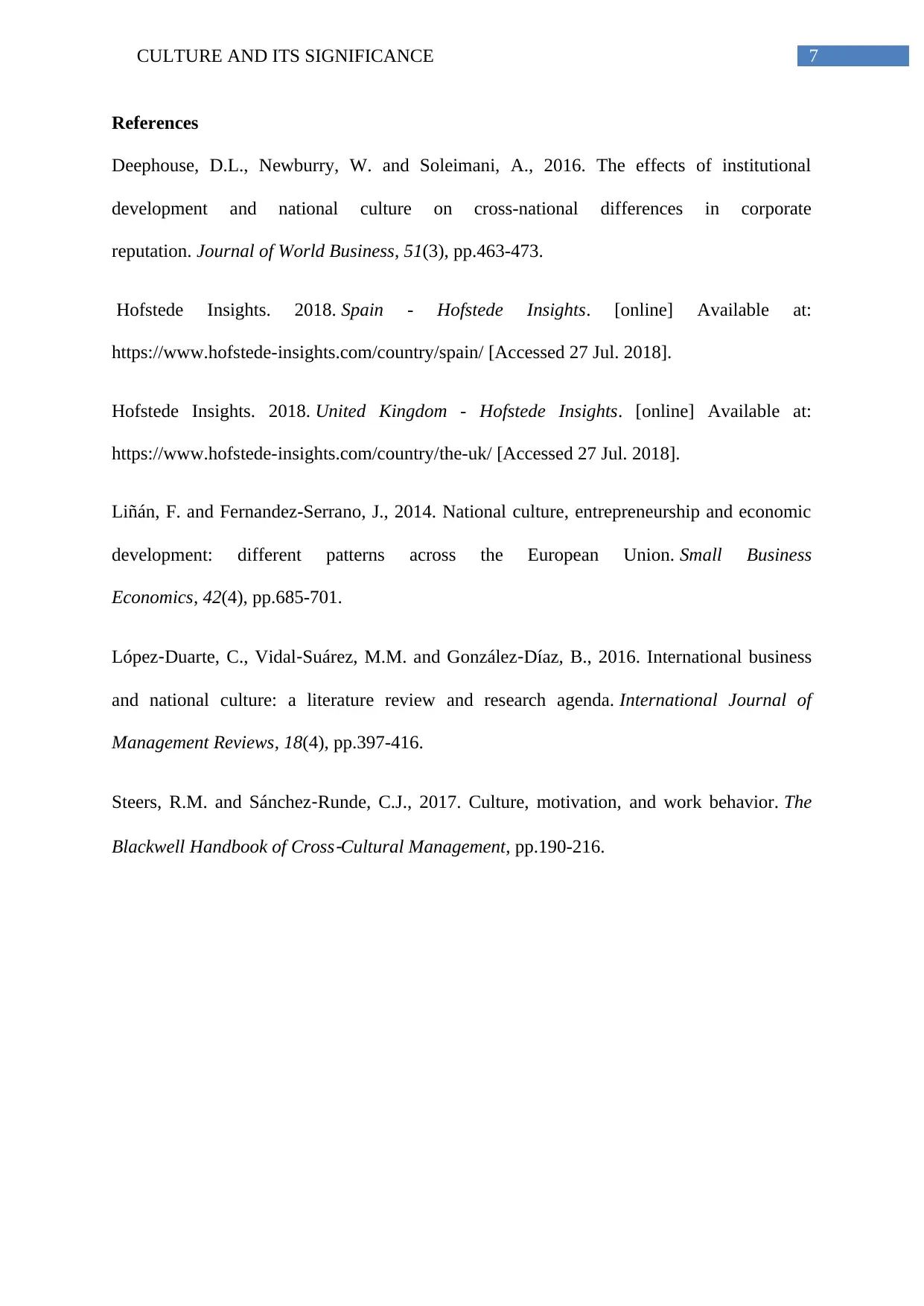
7CULTURE AND ITS SIGNIFICANCE
References
Deephouse, D.L., Newburry, W. and Soleimani, A., 2016. The effects of institutional
development and national culture on cross-national differences in corporate
reputation. Journal of World Business, 51(3), pp.463-473.
Hofstede Insights. 2018. Spain - Hofstede Insights. [online] Available at:
https://www.hofstede-insights.com/country/spain/ [Accessed 27 Jul. 2018].
Hofstede Insights. 2018. United Kingdom - Hofstede Insights. [online] Available at:
https://www.hofstede-insights.com/country/the-uk/ [Accessed 27 Jul. 2018].
Liñán, F. and Fernandez-Serrano, J., 2014. National culture, entrepreneurship and economic
development: different patterns across the European Union. Small Business
Economics, 42(4), pp.685-701.
López‐Duarte, C., Vidal‐Suárez, M.M. and González‐Díaz, B., 2016. International business
and national culture: a literature review and research agenda. International Journal of
Management Reviews, 18(4), pp.397-416.
Steers, R.M. and Sánchez‐Runde, C.J., 2017. Culture, motivation, and work behavior. The
Blackwell Handbook of Cross
‐Cultural Management, pp.190-216.
References
Deephouse, D.L., Newburry, W. and Soleimani, A., 2016. The effects of institutional
development and national culture on cross-national differences in corporate
reputation. Journal of World Business, 51(3), pp.463-473.
Hofstede Insights. 2018. Spain - Hofstede Insights. [online] Available at:
https://www.hofstede-insights.com/country/spain/ [Accessed 27 Jul. 2018].
Hofstede Insights. 2018. United Kingdom - Hofstede Insights. [online] Available at:
https://www.hofstede-insights.com/country/the-uk/ [Accessed 27 Jul. 2018].
Liñán, F. and Fernandez-Serrano, J., 2014. National culture, entrepreneurship and economic
development: different patterns across the European Union. Small Business
Economics, 42(4), pp.685-701.
López‐Duarte, C., Vidal‐Suárez, M.M. and González‐Díaz, B., 2016. International business
and national culture: a literature review and research agenda. International Journal of
Management Reviews, 18(4), pp.397-416.
Steers, R.M. and Sánchez‐Runde, C.J., 2017. Culture, motivation, and work behavior. The
Blackwell Handbook of Cross
‐Cultural Management, pp.190-216.
1 out of 8
Related Documents
Your All-in-One AI-Powered Toolkit for Academic Success.
+13062052269
info@desklib.com
Available 24*7 on WhatsApp / Email
![[object Object]](/_next/static/media/star-bottom.7253800d.svg)
Unlock your academic potential
Copyright © 2020–2025 A2Z Services. All Rights Reserved. Developed and managed by ZUCOL.




